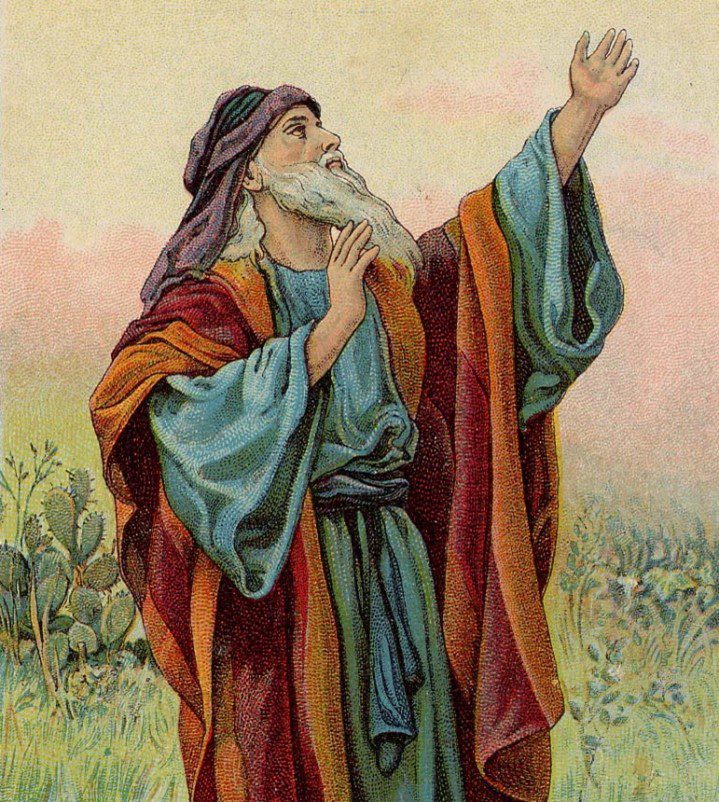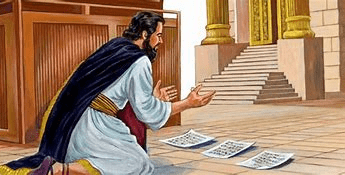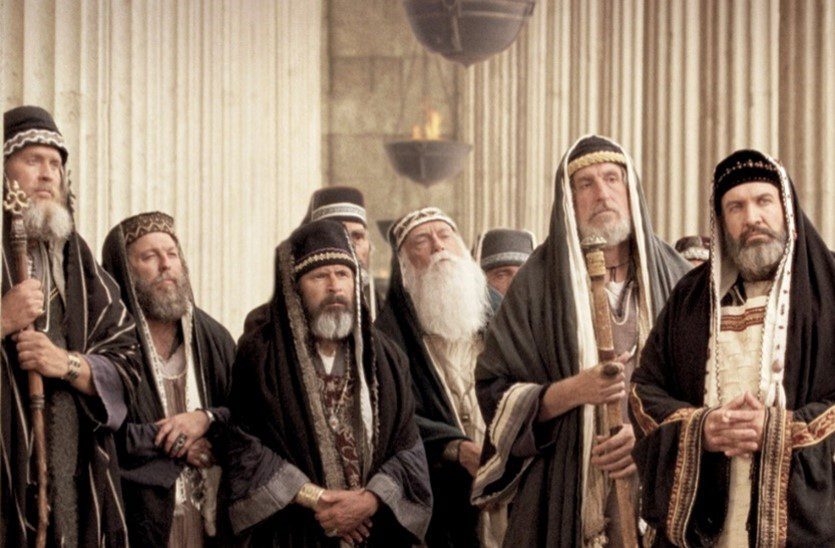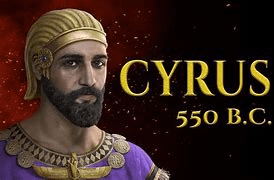Introduction
 Isaiah was the son of Amoz. His name means, “The Lord saves.” There is consensus amongst Hebrew scholars that he was the greatest of Hebrew writers. His words indicate that he was a man of refinement and culture. His prophecies are without equal as far as beauty and style, versatility of treatment, brilliance of imagery, and splendor of diction are concerned. His book is the first among the so-called “later prophets” and his name has been given to his prophetic collection.
Isaiah was the son of Amoz. His name means, “The Lord saves.” There is consensus amongst Hebrew scholars that he was the greatest of Hebrew writers. His words indicate that he was a man of refinement and culture. His prophecies are without equal as far as beauty and style, versatility of treatment, brilliance of imagery, and splendor of diction are concerned. His book is the first among the so-called “later prophets” and his name has been given to his prophetic collection.
He resided and ministered in Jerusalem from about 740 BC in “the year of king Uzziah’s death,” until 700 BC or somewhat later. He thus prophesied during the kingships of Uzziah, Jotham, Ahaz, and Hezekiah, all being kings of Judah (1:1). He was married to a prophetess (8:3) and had two sons: Shear-Jashub (7:3), “a remnant will return,” and Maher-shalal-hash-baz (8:3), “swift is the booty, speedy is the prey.” Thus, the name of the first child held a promise of mercy; the second, one of judgement.[1]
Isaiah received his commission from the Lord (6:8-12) and willingly accepted it, even though it will be to a people who will not respond as needed and it will end with the nation destroyed. Isaiah’s ministry was to both Judah and Israel. Israel was destroyed by the Assyrian in 722 BC and Judah in 586 BC by the Babylonians.
The uniqueness of Isaiah’s ministry
Luke records (4:18-19) the Lord Jesus commenced His public ministry at Nazareth by reading from Isaiah 61:1-2
“The Spirit of the Lord is upon me, because he has anointed me to proclaim good news to the poor. He has sent me to proclaim liberty to the captives and recovering of sight to the blind, to set at liberty those who are oppressed, to proclaim the year of the Lord’s favor.”
Isaiah is credited with the writing a history of the reign of King Uzziah (2 Chronicles 26:22).
 Isaiah inquired of the Lord at Hezekiah’s request, about the calamity that was about to befall Jerusalem. Hezekiah went into the temple and laid before the Lord Sennacherib’s demands and to pray for the Lord’s help in defeating the vast Assyrian army that had surrounded Jerusalem and was threatening them. Isaiah received his answer and there were 185,000 Assyrian soldiers lying dead the next morning. Sennacherib went back to Nineveh where he was murdered by one or both of his sons while he was praying to his gods exactly as Isaiah had prophesied (2 Kings 19; Isaiah 37:36-37). The incident was recorded by the Greek historian Herodotus in his manuscript Histories written in 450 BC. I have written a blog article on the whole incident here.
Isaiah inquired of the Lord at Hezekiah’s request, about the calamity that was about to befall Jerusalem. Hezekiah went into the temple and laid before the Lord Sennacherib’s demands and to pray for the Lord’s help in defeating the vast Assyrian army that had surrounded Jerusalem and was threatening them. Isaiah received his answer and there were 185,000 Assyrian soldiers lying dead the next morning. Sennacherib went back to Nineveh where he was murdered by one or both of his sons while he was praying to his gods exactly as Isaiah had prophesied (2 Kings 19; Isaiah 37:36-37). The incident was recorded by the Greek historian Herodotus in his manuscript Histories written in 450 BC. I have written a blog article on the whole incident here.
Although Isaiah did not list Manasseh as one of the Judean kings enthroned during his prophetic ministry, he does mention the death of Sennacherib which happened in 681 BC and even named his successor, Esarhaddon (37:38). Manasseh succeeded his father Hezekiah who died in 687 BC. So, it is possible that it was Isaiah who was placed in a hollow log and sawn in two from the instruction of the wicked Manasseh. (Hebrews 11:37).
The singularity of Isaiah’s authorship
His book appears to be divided into two parts, chapters 1to 35 warning of impending judgement and chapters 40-66 telling of God’s restoration and blessings. Chapters 36-39 act as an historic interlude that concludes chapters 1-35 and introduces chapters 40-66.
Liberal scholar J C Doederlein, published in 1789 a systematic argument that chapters 40-66 were written after Isaiah’s time in the 6th century by a second author. His work brought about the idea of two authors and is commonly known as deutero-Isaiah, deutero being two. H F W Gesenius supported this view in a publication in 1819 along with Ernst Rosenmuller. Bernhard Duhm went even further by proposing a “third Isaiah,” who wrote chapters 56-66 in Jerusalem at the time of Ezra. Some recent scholars such as W H Brownlee, hold that all 66 chapters came from a circle of disciples who followed or later studied Isaiah and his oral prophecies.[2]
However, the arguments against this are strong.
A solid reason for the unity of Isaiah is contained in the expression, “the Holy One of Israel,” a title for God that appears 12 time in chapters 1-39 and 14 times in chapters 40-66. Outside of Isaiah, it appears in the Old Testament only 6 times.
There are at least 25 Hebrew words or forms found through Isaiah that occur in no other prophetic writing.
The complete manuscript of Isaiah is part of the Dead Sea scrolls. They give no support for dual or multiple authorship of Isaiah. In fact, chapter 39 follows directly on to chapter 40.
Josephus assumes one author and the Septuagint (the Greek translation of the Old Testament) has one heading for the entire book.
 Christ referred to Isaiah as a distinct individual in Mattew 15:7-9 when He quoted Isaiah 29:13 in His criticisim of the Pharisees and Teachers of the Law.
Christ referred to Isaiah as a distinct individual in Mattew 15:7-9 when He quoted Isaiah 29:13 in His criticisim of the Pharisees and Teachers of the Law.
You hypocrites! Isaiah was right when he prophesied about you: “‘These people honor me with their lips, but their hearts are far from me. They worship me in vain; their teachings are merely human rules.
There are several New Testament verses that refer to the prophet Isaiah in many parts of the book: Matthew 12:17-21 (Isaiah 42:1-4); Matthew 3:3 and Luke 3:4 (Isaiah 40:3); Romans 10:16, 20 (Isaiah 53:1 and 65:1). Most telling is John 12:38-41, where he quotes from both parts of Isaiah (Isaiah 6:10 and 53:1).
Archeology confirms Isaiah and his writings.
Archeological remains bear witness to several historical, physical, and cultural elements in Isaiah. The book is set largely against the backdrop of events of the eighth century BC, many of which are well attested in physical remains. Foreign records like the Sennacherib prism and the relief at his Ninevah palace give dramatic testimony in text and picture to the Assyrian invasion of Judah and Jerusalem described in Isaiah. These dovetail well with the biblical accounts of the same events. The Cyrus Cylinder records Cyrus’s release of exiles as prophesied by Isaiah. Archeological remains in Jerusalem also illustrate places and things in the Judean capital named and/or describe in Isaiah, including the city’s wall, gates, and homes. Archaeological remains illustrate cultural realities addressed by Isaiah, such as altars, standing stones and high places that bear witness to Israel’s unfortunate idolatry.[3]
Isaiah’s profound, accurate, and confirmed prophecies.
This is what the Bible says about prophecies.
For no prophecy was ever produced by the will of man, but men spoke from God as they were carried along by the Holy Spirit. 2 Peter 1:21
 The Cyrus prophecy
The Cyrus prophecy
Cyrus would not only allow, but also assist, the Israelites to return and rebuild Jerusalem and the temple. These specific prophecies were made 150 years before Cyrus was born.
Isaiah 44:28
… who says of Cyrus, ‘He is my shepherd and will accomplish all that I please;
he will say of Jerusalem, “Let it be rebuilt,” and of the temple, “Let its foundations be laid.”’
Isaiah 45:1
“This is what the LORD says to his anointed, to Cyrus, whose right hand I take hold of to subdue nations before him and to strip kings of their armor, to open doors before him so that gates will not be shut:
Cyrus captured Babylon in 539 BC and ruled until 530 BC. The following is from Ezra 1:2-3 which is the fulfilment of Isaiah’s prophecy which was the same as that from Jeremiah (Jeremiah 25:11-12) some 120 years later.
“This is what Cyrus king of Persia says: “‘The LORD, the God of heaven, has given me all the kingdoms of the earth and he has appointed me to build a temple for him at Jerusalem in Judah. Any of his people among you may go up to Jerusalem in Judah and build the temple of the LORD, the God of Israel, the God who is in Jerusalem, and may their God be with them.
Messianic prophecies
The standout feature of Isaiah is his Messianic prophecies, more than any other Old Testament book. These are numerous, far-reaching, detailed, and accurate. The following are by Pinterest.
He will be born of a virgin. 7:14. Fulfilled Matthew 1:20-23; Luke 1:26-35
He will cause those who don’t believe in him to stumble. 8:14. Fulfilled Luke 2:34; Romans 9:32-33.
His ministry will begin in Galilee. 9:1. Fulfilled Matthew 4:12-15, 23.
His kingdom will last forever. 9:7. Fulfilled Luke 1:32-33.
He will be a descendant of Jesse. 11:1, 10. Fulfilled Matthew 1:1, 16 and 17.
He will be followed by Gentiles. 11:10; 56:6-8. Fulfilled John 10:16; Acts10:34-35,45, 47.
He will be considered the chief cornerstone. 28:16. Fulfilled 1 Peter 2:6-7.
He will heal the sick. 35:5-6. Fulfilled Matthew 11:4-6; John 9:6-7.
He will be preceded by a messenger. 40:3. Fulfilled 1:17, 76-77.
He will be humble yet bring forth justice. 42:1-6. Fulfilled Matthew 12:15-21.
He will endure people spitting on him and beating him. 50:6. Fulfilled Matthew 26-27.
He will be rejected and despised. 53:3. Fulfilled Matthew 13:57; Mark 6:4.
He will suffer. 53:3 and 10. Fulfilled Matthew 27:26, 29.
He will be punished and die for our sins. 53:4-5, 8, 11-12. Fulfilled 2 Corinthians 2:5:21.
He will not defend himself. 53:7. Fulfilled 2 Corinthians 5:21.
He will be buried with the rich. 53:9. Fulfilled John 19:38-42.
He will be anointed by God’s Spirit. 61:1. Fulfilled Matthew 3:16; Mark 1:10.
He will minister in public. 61:1-3. Fulfilled Luke 4:16-21 and 43.
Conclusion
God had called Isaiah as His servant (6:8-12). Through him, He made the most significant announcements in world history.
- He heralded the coming Messiah with numerous detailed statements which history has shown to have been accurate.
- He had the great privilege to have been quoted by the Messiah, Jesus, when He announced the commencement of His earthly ministry.
- Isaiah prophesied that God would punish His adulterous people by sending them into exile and it was Isaiah who named the man who would facilitate their return to Jerusalem and rebuild it and the temple as well.
[2] Charles F Pfeiffer, Howard F Vos and John Rea, Wycliffe Bible Dictionary, Hendrickson Publishers, 1998, page 857.
[3] Archaeological Study Bible, English Standard Version, Crossway, 2017, page 959.


2 Comments. Leave new
I have always loved Isaiah there’s so much end times information. When I want to know about Jesus’ sufferings I turn to Isaiah and Psalm 22. Can you just imagine Yahweh still retained the Holy Spirit of our Father, and could have easily vanished all or at least when they hit him let it break their hands and give them really really pain. At least give them all hemorrhoids and the more hate the worse the pain. Enough pain without giving away that’s it could be coming from Jesus. By having Father’s Holy Spirit
inside his body I guess that’s what kept Jesus’ body from deteriorating. Enjoyed your article, your friend, bob wheeler
Thanks for the insights. Isaiah is known as the miniature bible having 66 chapters just as the bible has 66 books. The first 39 chapters likened to the old testament with 39 books was full of doom of despair as a result of disobedience. The 40th chapter to 66chapter(27) likened to the new testament books(27) announces zoom of hope and salvation for mankind as a result of of obedience of Christ the seed of woman prophesied in Genesis to bruise the head of the serpent the devil was fulfilled.